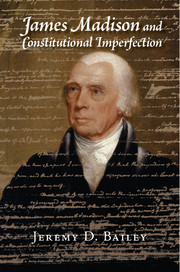Book contents
- Frontmatter
- Dedication
- Contents
- Preface
- Acknowledgments
- Abbreviations
- 1 The Madison Problem
- 2 Appeals to Tradition: The Case for and against Veneration
- 3 Appeals to Elites: The Problem with Deliberation
- 4 Public Opinion before Parties
- 5 The Turn to Public Opinion
- 6 Appeals to the People: Madison and the Revolution of 1800
- 7 Appeals to Text and History
- 8 “Take care of me when dead”
- Index
3 - Appeals to Elites: The Problem with Deliberation
Published online by Cambridge University Press: 05 November 2015
- Frontmatter
- Dedication
- Contents
- Preface
- Acknowledgments
- Abbreviations
- 1 The Madison Problem
- 2 Appeals to Tradition: The Case for and against Veneration
- 3 Appeals to Elites: The Problem with Deliberation
- 4 Public Opinion before Parties
- 5 The Turn to Public Opinion
- 6 Appeals to the People: Madison and the Revolution of 1800
- 7 Appeals to Text and History
- 8 “Take care of me when dead”
- Index
Summary
As the last chapter argued, Madison offered the argument from veneration because of the very real possibility that moderates would be persuaded by calls for a second convention. This fear of a second convention was also related to Madison's turn to the Bill of Rights, a turn examined in detail in the next chapter. But this fear of a second convention is worthy of attention in its own right because it signals a problem with the standard accounts of Madison and Madisonian constitutionalism. Specifically, if Madison thought that a convention of specially chosen delegates would be unable to deliberate during times of founding, then on what basis did Madison think those very same individuals would be able to govern during times of normal politics? Put simply, if Madison distrusted elites during times of founding, what did he think of their capacity for deliberation during times of ordinary politics?
This question of deliberation during normal politics calls into question a fundamental pillar of Madisonian constitutionalism because it forces us to reconsider the nature of representation within Madison's constitutional thought. Because it has long been held that a central tenet of Madisonian constitutionalism is that representatives would “refine and enlarge” the opinions and interests of their constituents, the question of deliberation is especially important. This point can be illustrated by pointing to Edmund Burke's well-known assertion of what is frequently called the trustee model of representation. In the most well-known passage of his speech at Bristol, Burke explicitly connected the strong theory of representation with deliberation:
Parliament is not a congress of ambassadors from different and hostile interests; which interests each must maintain, as an agent and advocate against other agents and advocates; but parliament is a deliberative assembly of one nation, with one interest, that of the whole; where, not local purposes, not local prejudices, ought to guide, but the general good, resulting from the general reason of the whole.
- Type
- Chapter
- Information
- James Madison and Constitutional Imperfection , pp. 38 - 58Publisher: Cambridge University PressPrint publication year: 2015



